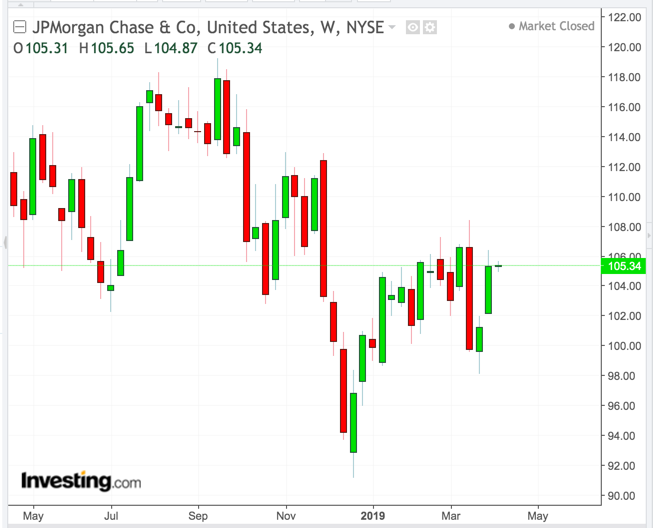* Reports Q1 2019 results on Friday, April 12 before the market opens
* Revenue expectation: $28.45 billion
* EPS expectation: $2.35
Wall Street’s powerhouse commercial and investment bank, JPMorgan Chase & Co. (NYSE:JPM), has much at stake when it reports its first-quarter earnings tomorrow. Investors are keenly watching if the earnings miss in the final quarter of 2018 was a blip, or the beginning of a trend.
Driven by strong loan growth and robust business in the lender’s flagship investment banking division, the last 12 months proved a great year for JPMorgan. The bank posted a record net income — even when you take out the benefits from U.S. tax reforms. But the last quarter showed cracks in this otherwise stellar performance. Revenue form the fixed-income trading plunged 18%, the worst performance in a decade, while increasing costs crimped margins further. Both of these headwinds resulted in profit and earnings growth that missed analysts’ expectations, the first such setback since 2015.

Despite officials claiming that a one time miss shouldn’t be mistaken for a trend, investors don’t seem too convinced. JPM stock has been under pressure in recent months. Trading at $105.34 at yesterday"s close, it’s down about 6% during the past year, while its recovery from the December correction has also been weak.
This uncertainty has also been reflected in analysts’ Q1 consensus forecast. On average, expectations are for EPS to remain flat vs the same period a year ago, at $2.35, on sales of $28.45 billion.
Growth Outlook Is Improving
Despite this uncertainty, we see many improvements since the final quarter of 2018 that bode well for bank’s earnings. The markets have shown remarkable resilience since going through their steep correction in December. That means strong trading revenue for JPMorgan and other lenders.
On the macro front, the U.S. and China have moved closer to settling their trade dispute, and a potential deal will remove a major hurdle which is threatening global growth and banks’ loan expansion. While Federal Reserve Chairman Jerome Powell said last month that underlying economic fundamentals remain strong, policy makers have cut their outlook for growth this year and next and forecast no interest rate hikes for 2019.
Though low interest rates are generally considered negative for banks, they may fuel more loan expansion, helping JPM to increase its lending activity. That’s what JPM’s Chief Executive Officer Jamie Dimon pointed out early this year when he told analysts that the near-term outlook for credit is relatively rosy.
Bottom Line
Investing in JPMorgan stock may seem unappealing when there are still many headwinds threatening the global economy, but the lender looks cheap after the recent weakness in its share price. Its annual dividend yield of more than 3% is offering a bargain when compared to its five-year average of 2.3%. For long-term investors looking to keep a quality banking stock in their portfolios, JPMorgan valuations are attractive. Improving macro outlook and the bank’s strong position in the U.S. and globally make it a good long-term bet.
